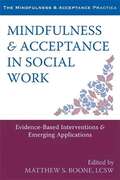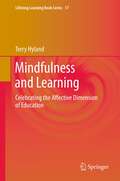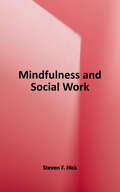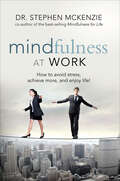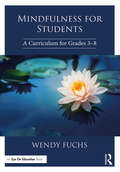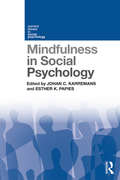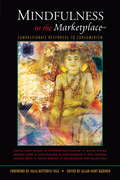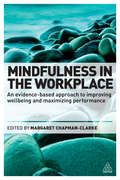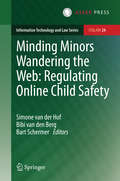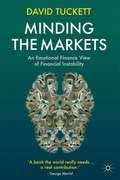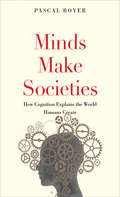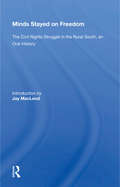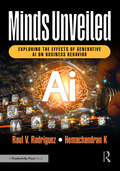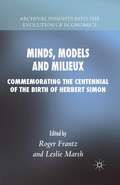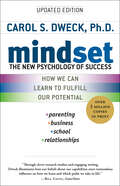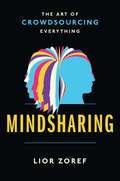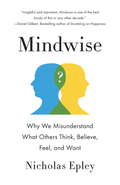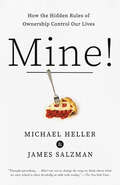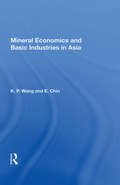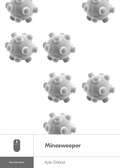- Table View
- List View
Mindfulness and Acceptance in Couple and Family Therapy
by Diane R. GehartThis book reviews the research and philosophical foundations for using mindfulness, acceptance, and Buddhist psychology in couple and family therapy. It also provides a detailed and practical approach for putting these ideas into action in the therapy room, including a mindful approach to therapeutic relationships, case conceptualization, treatment planning, teaching meditation, and intervention.
Mindfulness and Acceptance in Social Work: Evidence-Based Interventions and Emerging Applications (Context Press Mindfulness And Acceptance Practica Ser.)
by Matthew S. BooneSocial work focuses on serving the most vulnerable members of society, and social workers must often address the contextual forces that contribute to human problems. Mindfulness and acceptance are powerful tools for this practice. By offering interventions like dialectical behavior therapy (DBT), mindfulness-based stress reduction (MBSR), and acceptance and commitment therapy (ACT), social workers can help their clients become more aware and take effective action. <p><p>In Mindfulness and Acceptance in Social Work, editor and social worker Matthew S. Boone brings together contributions from emerging voices in social work, such as Elana Rosenbaum, Yuk-Lin Renita Wong, and Diana Coholic, along with ACT pioneers Kirk Strosahl, Patricia Robinson, and others. This book focuses not only on mindfulness-based interventions for direct practice, but also on the intersection of mindfulness and social work education, cultural diversity, and macro social work. It includes a framework for moving past culturally-informed biases, and for how to best utilize mindfulness interventions for both individuals and the community at large.
Mindfulness and Learning: Celebrating the Affective Dimension of Education
by Terry HylandIn recent decades, education at all levels has been seriously impoverished by a growing obsession with standards, targets, skills and competences. According to this model, only a circumscribed range of basic cognitive skills and competences are the business of education, whose main role is to provide employability credentials for people competing for jobs in the global economy. The result is a one-dimensional, economistic and bleakly utilitarian conception of the educational task. In Mindfulness and Learning: Celebrating the Affective Dimension of Education, Terry Hyland advances the thesis that education stands in need of a rejuvenation of its affective function - the impact it has on the emotional, social, moral and personal development of learners. Drawing on the Buddhist conception of mindfulness, he advances a powerful argument for redressing this imbalance by enhancing the affective domain of learning. Mindfulness and Learning: Celebrating the Affective Dimension of Education shows how the concept and practice of 'mindfulness' - non-judgmental, present moment awareness and experience - can enrich learning at all levels. Mindfulness thus contributes to the enhanced achievement of general educational goals, and helps remedy the gross deficiency of the affective/emotional aspects of contemporary theory and practice. The author outlines a mindfulness-based affective education (MBAE) programme and shows how it might be introduced into educational provision from the early years to adult education with a view to harmonising the cognitive-affective balance across the system.
Mindfulness and Social Work
by Steven S. HickFor the first time ever, a book has been written tying mindfulness techniques to social work practice. Editor Steven Hick has compiled this collection of essays to provide a model for the use of mindfulness in social work practice with individuals, families, groups, and communities. Focused on both mindfulness interventions and the development of mindfulness within the practitioner, this book contains exercises for use by social workers themselves or with clients.
Mindfulness at Work: How to Avoid Stress, Achieve More, and Enjoy Life!
by Stephen McKenzieMindfulness isn’t anything that we think; it’s what we don’t think. Mindfulness isn’t something that other people do; it’s something that we all do. Mindfulness is an ancient, life-enhancing, healing technique that can help us remember our natural state of happiness and health, even if we think we are too modern and too busy to prioritize what’s really important—being fully alive and fully alive to our full life potential.Mindfulness at Work reveals how the practice of mindfulness—the ability to focus our attention on what is rather than be distracted by what isn’t—can be a powerful antidote to the distractions and stresses of our modern lives, especially our working lives. It gives you powerful tools to:Reduce your stressBecome more productiveImprove your decision-making skillsWork more creativelyDevelop your leadership skillsAnd much moreWritten by an expert with years of both clinical and personal experience, Mindfulness at Work includes examples of mindfulness in action in the workplace, while also showing you how to apply its lessons to specific professions, from sales to teaching, from law to medicine, from the trades to the creative arts.
Mindfulness for Students: A Curriculum for Grades 3-8
by Wendy FuchsWhat if you walked into your classroom to find a room full of students who were working cooperatively with one another, focusing on the day’s lesson, and able to regulate their own thoughts and feelings? Learn how to teach mindfulness strategies to your elementary and middle school students to provide a foundation for social-emotional well-being and academic engagement. Based on research and designed to complement any school setting, no matter how busy, the practices in this book will create the groundwork for a positive and productive learning environment. The curriculum covers these five key mindfulness practices: Breath awareness Body awareness Focusing on gratitude Kindness toward self and others Open awareness Each chapter includes a detailed lesson plan with suggested wording, as well as support materials (e.g., journal templates, activity sheets, and infographics). These tools, as well as audio recordings of the practices, are also available on our website as free eResources for classroom use (www.routledge.com/9781138586550).
Mindfulness in Social Psychology
by Esther K. Papies Johan C. KarremansScientific interest in mindfulness has expanded in recent years, but it has typically been approached from a clinical perspective. This volume brings recent mindfulness research to classic social psychology topics such as romantic relationships, prejudice, prosocial behavior, achievement, and self-control. Written by renowned scholars in social psychology, it combines a comprehensive research overview with an in-depth analysis of the processes through which mindfulness affects people’s daily life experiences. It provides theoretical and methodological guidance for researchers across disciplines and discusses fundamental processes in mindfulness, including its effect on emotion regulation, executive control, automatic and deliberative processing, and its relationship to self-construal and self-identity. This book will be of particular interest to upper-level students and researchers in social psychology, health psychology, and clinical psychology, as well as social work and psychology professionals.
Mindfulness in the Marketplace: Compassionate Responses to Consumerism
by Julia Hill Allan Hunt BadinerMindfulness in the Marketplace suggests a reorientation of consumers from passive purchasers to aware, responsible citizens who see the dynamic connection between their purchases and their values. The Middle Path of Buddhism is not to avoid all consumption, but to consume mindfully in a manner that protects ourselves and all living systems. This anthology outlines a path of compassionate resistance to global corporatization, and offers a view of getting into right relationship with the Earth. Includes the Dalai Lama, Thich Nhat Hanh, Stephen Batchelor, and Joanna Macy.
Mindfulness in the Workplace: An Evidence-based Approach to Improving Wellbeing and Maximizing Performance
by Margaret A. Chapman-ClarkeMindfulness-based interventions in organizations offer the potential to build individual and organizational resilience, engage employees and address workplace stress. Mindfulness in the Workplace is a practical guide written for practitioners who want to learn how mindfulness can be used as a change management and organizational development strategy. Drawing from the latest research evidence from neuro- and behavioural science, Mindfulness in the Workplace offers a framework and guidance on how to start evolution- not revolution- in the organization. It ensures the greatest chance of success, showing how to identify the key stakeholders and work with them on understanding the power of a mindfulness initiative, how to identify a mindfulness champion, adapt the language of mindfulness to the context of the organization, establish metrics, and measure return on investment. Mindfulness in the Workplace proposes that HR and OD professionals are best placed to understand the complexity of implementing change in organizational systems and, therefore, the practice of mindfulness need to be brought in-house, even if they bring in external mindfulness coaches to train their leaders. Case studies including Capital One Finance and the NHS Mental Health Trust cover the reasoning behind these initiatives, how they were planned, the barriers they faced, the lessons learned, and their results. This book offers a forum for HR and OD practitioners to hear from other practitioners who have implemented organizational mindfulness-based interventions using change management principles so that they can understand how they might be applied to their own practice and their own organizations.
Minding Minors Wandering the Web: Regulating Online Child Safety
by Simone van der Hof Bibi van den Berg Bart SchermerEnsuring online safety has become a topic on the regulatory agenda in many Western societies. However, regulating for online safety is far from easy, due to the wide variety of national and international, private and public actors and stakeholders that are involved. When regulating online risks for children it is important to strike the right balance between protection against harms on the one hand and safeguarding their fundamental freedoms and rights on the other. The authors in this book attempt to grapple with precisely this theme: striking the right balance between ensuring safety for children on the internet while at the same time enabling them to experiment, to learn, to enrich their lives, to acquire skills and to have fun using this global network. The authors come from various scientific disciplines, ranging from law to social science and from media studies to philosophy. This means that the book provides the reader with both empirical and theoretical/conceptual chapters and sheds a multi-disciplinary light on the complex topic of regulating online safety for children.
Minding the Markets: An Emotional Finance View of Financial Instability
by David TuckettTuckett argues that most economists' explanations of the financial crisis miss its essence; they ignore critical components of human psychology. He offers a deeper understanding of financial market behaviour and investment processes by recognizing the role played by unconscious needs and fears in all investment activity.
Minds Make Societies: How Cognition Explains the World Humans Create
by Pascal BoyerA scientist integrates evolutionary biology, genetics, psychology, economics, and more to explore the development and workings of human societies. &“There is no good reason why human societies should not be described and explained with the same precision and success as the rest of nature.&” Thus argues evolutionary psychologist Pascal Boyer in this uniquely innovative book. Integrating recent insights from evolutionary biology, genetics, psychology, economics, and other fields, Boyer offers precise models of why humans engage in social behaviors such as forming families, tribes, and nations, or creating gender roles. In fascinating, thought-provoking passages, he explores questions such as: Why is there conflict between groups? Why do people believe low-value information such as rumors? Why are there religions? What is social justice? What explains morality? Boyer provides a new picture of cultural transmission that draws on the pragmatics of human communication, the constructive nature of memory in human brains, and human motivation for group formation and cooperation.&“Cool and captivating…It will change forever your understanding of society and culture.&”—Dan Sperber, co-author of The Enigma of Reason&“It is highly recommended…to researchers firmly settled within one of the many single disciplines in question. Not only will they encounter a wealth of information from the humanities, the social sciences and the natural sciences, but the book will also serve as an invitation to look beyond the horizons of their own fields.&”—Eveline Seghers, Evolutionary Studies in Imaginative Culture
Minds Stayed On Freedom: The Civil Rights Struggle In The Rural South--an Oral History
by Jay MacLeodMinds Stayed on Freedom is a vivid portrait of the civil rights struggle in one Mississippi county. While the national Movement has been painted in broad strokes by journalists and scholars, here the experiences of ordinary people bring definition to the lived texture of the Civil Rights Movement. Interviewed by local youths, Movement veterans recount how they overcame their fear in the face of terrorist resistance and collectively transformed the political and social fabric of their community. Their stories were repeated across the rural South, although seldom with the force and vigor experienced in Holmes County, located in the Mississippi plantation country. The teenagers who conducted this oral history project strike a rare balance between poignant prose and pathbreaking research. The detailed picture that emerges from the interviews brings into sharp relief issues that remain hazy in studies of national scope: the crucial resource of black land ownership, the limited extent of church involvement, the commitment to armed self-defense, the role of women, divisions of social class within the Movement, the range of white response and retaliation, and the interplay between direct action and legal tactics. Minds Stayed on Freedom provides plenty of fodder for academic analysis, but the interviews retain a raw, dramatic power. As project advisor Jay MacLeod of the Rural Organizing and Cultural Center writes in his introduction, "The drama in Holmes County began when a group of black farmers attempted to register to vote. Whites retaliated, pitting themselves directly against a small group of courageous black activists. The two sides battled each other. But they also battled for the hearts and minds of the black population. The tiny local Movement, armed with a vision of the future, tried to draw its people off the sidelines and into active involvement. Whites ntried to keep Holmes County blacks in their 'place' with a campaign of terror and intimidation. Minds Stayed
Minds Unveiled: Exploring the Effects of Generative AI on Business Behavior
by Hemachandran K Raul V. RodriguezThis book demonstrates how generative artificial intelligence (AI), a form of sophisticated AI technology, is transforming our knowledge of how the human mind functions in relation to business leadership and decision-making. It describes the most recent findings and applications of generative AI in psychology. The book explains the relationships between language, thinking, and behavior as well as how AI may aid in our understanding of learning, decision-making, and problem-solving. In addition, it discusses the significance of applying AI properly and ethically. This book provides a comprehensive overview of how AI is increasing our understanding of the mind and how it impacts each of us professionally.
Minds on Fire
by Mark C. CarnesWhy are so many students intellectually disengaged? Faculty, administrators, and tuition-paying parents have been asking this question for nearly two centuries. And the answer is always more or less the same: students are so deeply absorbed in competitive social play (fraternities, sports, beer pong, World of Warcraft, social media) that they neglect academics. In Minds on Fire, Carnes shows how role-immersion games channel studentsâe(tm) competitive (and sometimes mischievous) impulses into transformative learning experiences. His discussion is based on interviews with scores of students and faculty who have used a pedagogy called Reacting to the Past, which features month-long games set during the French revolution, Galileo's trial, the partition of India, and dozens of other epochal moments in disciplines ranging from art history to the sciences. These games have spread to over three hundred campuses around the world, where many of their benefits defy expectations. Students think more critically by internalizing alternative selves, and they understand the past better by filtering it through their present. Fierce competition between opposing sides leads to strong community bonds among teammates and develops speaking, writing, leadership, and problem-solving skills. Minds on Fire is a provocative critique of educational reformers who deplored role-playing pedagogies, from Plato to Dewey to Erikson. Carnes also makes an impassioned appeal for pedagogical innovation. At a time when cost-cutting legislators and trustees are increasingly drawn to online learning, Carnes focuses on how bricks-and-mortar institutions of higher education can set young minds on fire.
Minds, Models and Milieux: Commemorating the Centennial of the Birth of Herbert Simon (Archival Insights into the Evolution of Economics)
by Leslie Marsh Roger FrantzThis book is a collection of specially-commissioned chapters from philosophers, economists, political and behavioral economists, cognitive and organizational psychologists, computer scientists, sociologists and permutations thereof as befits the polymathic subject of this book: Herbert Simon. The tripartite of the title, Minds, Models and Milieux, connotes the three inextricably linked areas to which Herbert Simon made the most distinguished of contributions. 'Minds' connotes Simon's abiding interest in theorizing human behavior, rationality, and decision-making; 'Models' connotes his extensive computer simulation work in the service of his interest in understanding minds, but also in the service of minds that are situated in a complex social 'Milieux'.This collection while intended to commemorate the centenary of Simon's birth simultaneously offers a timely reassessment of some of his central insights and illustrates the exponentially growing interest in Simon's work from beyond the usual disciplines and constituencies.
Mindset: The New Psychology of Success
by Carol S. DweckWorld-renowned Stanford University psychologist Carol Dweck, in decades of research on achievement and success, has discovered a truly groundbreaking idea--the power of our mindset.In this brilliant book, Dweck shows how success in school, work, sports, the arts, and almost every area of human endeavor can be dramatically influenced by how we approach our goals. People with a fixed mindset--those who believe that abilities are fixed--are far less likely to flourish than those with a growth mindset--those who believe that abilities can be developed through hard work, good strategies, and mentorship. Mindset reveals how great parents, teachers, managers, and athletes can put this idea to use to foster outstanding accomplishment. Praise for Mindset"A good book is one whose advice you believe. A great book is one whose advice you follow. This is a book that can change your life, as its ideas have changed mine."--Robert J. Sternberg, co-author of Teaching for Wisdom, Intelligence, Creativity, and Success "An essential read for parents, teachers [and] coaches . . . as well as for those who would like to increase their own feelings of success and fulfillment."--Library Journal (starred review) "Everyone should read this book."--Chip Heath and Dan Heath, authors of Made to Stick "One of the most influential books ever about motivation."--Po Bronson, author of NurtureShock "If you manage people or are a parent (which is a form of managing people), drop everything and read Mindset."--Guy Kawasaki, author of The Art of the Start 2.0From the Hardcover edition.
Mindsharing
by Lior ZorefWhether we need to make better financial choices, find the love of our life, or transform our career, crowdsourcing is the key to making quicker, wiser, more objective decisions. But few of us even come close to tapping the full potential of our online personal networks. Lior Zoref offers proven guidelines for applying what he calls "mind sharing" in new ways. For instance, he shows how a mother's Facebook update saved the life of a four-year-old boy, and how a manager used LinkedIn to create a year's worth of market research in less than a day. Zoref's clients are using his techniques to innovate and problem-solve in record time. Now he reveals how crowdsourcing has the ability to supercharge our thinking and upgrade every aspect of our lives.
Mindwise
by Nicholas EpleyYou are a mind reader, born with an extraordinary ability to understand what others think, feel, believe, want, and know. It's a sixth sense you use every day, in every personal and professional relationship you have. At its best, this ability allows you to achieve the most important goal in almost any life: connecting, deeply and intimately and honestly, to other human beings. At its worst, it is a source of misunderstanding and unnecessary conflict, leading to damaged relationships and broken dreams. How good are you at knowing the minds of others? How well can you guess what others think of you, know who really likes you, or tell when someone is lying? How well do you really understand the minds of those closest to you, from your spouse to your kids to your best friends? Do you really know what your coworkers, employees, competitors, or clients want?In this illuminating exploration of one of the great mysteries of the human mind, University of Chicago psychologist Nicholas Epley introduces us to what scientists have learned about our ability to understand the most complicated puzzle on the planet--other people--and the surprising mistakes we so routinely make. Why are we sometimes blind to the minds of others, treating them like objects or animals? Why do we sometimes talk to our cars, or the stars, as if there is a mind that can hear us? Why do we so routinely believe that others think, feel, and want what we do when, in fact, they do not? And why do we believe we understand our spouses, family, and friends so much better than we actually do? Mindwise will not turn other people into open books, but it will give you the wisdom to revolutionize how you think about them--and yourself. From the Hardcover edition.
Mindwise
by Nicholas EpleyYou are a mind reader, born with an extraordinary ability to understand what others think, feel, believe, want, and know. It's a sixth sense you use every day, in every personal and professional relationship you have. At its best, this ability allows you to achieve the most important goal in almost any life: connecting, deeply and intimately and honestly, to other human beings. At its worst, it is a source of misunderstanding and unnecessary conflict, leading to damaged relationships and broken dreams. How good are you at knowing the minds of others? How well can you guess what others think of you, know who really likes you, or tell when someone is lying? How well do you really understand the minds of those closest to you, from your spouse to your kids to your best friends? Do you really know what your coworkers, employees, competitors, or clients want?In this illuminating exploration of one of the great mysteries of the human mind, University of Chicago psychologist Nicholas Epley introduces us to what scientists have learned about our ability to understand the most complicated puzzle on the planet--other people--and the surprising mistakes we so routinely make. Why are we sometimes blind to the minds of others, treating them like objects or animals? Why do we sometimes talk to our cars, or the stars, as if there is a mind that can hear us? Why do we so routinely believe that others think, feel, and want what we do when, in fact, they do not? And why do we believe we understand our spouses, family, and friends so much better than we actually do? Mindwise will not turn other people into open books, but it will give you the wisdom to revolutionize how you think about them--and yourself. From the Hardcover edition.
Mindwise
by Nicholas EpleyYou are a mind reader, born with an extraordinary ability to understand what others think, feel, believe, want, and know. It's a sixth sense you use every day, in every personal and professional relationship you have. At its best, this ability allows you to achieve the most important goal in almost any life: connecting, deeply and intimately and honestly, to other human beings. At its worst, it is a source of misunderstanding and unnecessary conflict, leading to damaged relationships and broken dreams. How good are you at knowing the minds of others? How well can you guess what others think of you, know who really likes you, or tell when someone is lying? How well do you really understand the minds of those closest to you, from your spouse to your kids to your best friends? Do you really know what your coworkers, employees, competitors, or clients want?In this illuminating exploration of one of the great mysteries of the human mind, University of Chicago psychologist Nicholas Epley introduces us to what scientists have learned about our ability to understand the most complicated puzzle on the planet--other people--and the surprising mistakes we so routinely make. Why are we sometimes blind to the minds of others, treating them like objects or animals? Why do we sometimes talk to our cars, or the stars, as if there is a mind that can hear us? Why do we so routinely believe that others think, feel, and want what we do when, in fact, they do not? And why do we believe we understand our spouses, family, and friends so much better than we actually do? Mindwise will not turn other people into open books, but it will give you the wisdom to revolutionize how you think about them--and yourself. From the Hardcover edition.
Mindwise
by Nicholas EpleyYou are a mind reader, born with an extraordinary ability to understand what others think, feel, believe, want, and know. It's a sixth sense you use every day, in every personal and professional relationship you have. At its best, this ability allows you to achieve the most important goal in almost any life: connecting, deeply and intimately and honestly, to other human beings. At its worst, it is a source of misunderstanding and unnecessary conflict, leading to damaged relationships and broken dreams. How good are you at knowing the minds of others? How well can you guess what others think of you, know who really likes you, or tell when someone is lying? How well do you really understand the minds of those closest to you, from your spouse to your kids to your best friends? Do you really know what your coworkers, employees, competitors, or clients want? In this illuminating exploration of one of the great mysteries of the human mind, University of Chicago psychologist Nicholas Epley introduces us to what scientists have learned about our ability to understand the most complicated puzzle on the planet--other people--and the surprising mistakes we so routinely make. Why are we sometimes blind to the minds of others, treating them like objects or animals? Why do we sometimes talk to our cars, or the stars, as if there is a mind that can hear us? Why do we so routinely believe that others think, feel, and want what we do when, in fact, they do not? And why do we believe we understand our spouses, family, and friends so much better than we actually do? Mindwise will not turn other people into open books, but it will give you the wisdom to revolutionize how you think about them--and yourself. From the Hardcover edition.
Mine!: How the Hidden Rules of Ownership Control Our Lives
by James Salzman Michael A. HellerA hidden set of rules governs who owns what--explaining everything from whether you can recline your airplane seat to why HBO lets you borrow a password illegally--and in this lively and entertaining guide, two acclaimed law professors reveal how things become "mine.""Mine" is one of the first words babies learn. By the time we grow up, the idea of ownership seems natural, whether buying a cup of coffee or a house. But who controls the space behind your airplane seat: you reclining or the squished laptop user behind? Why is plagiarism wrong, but it's okay to knock-off a recipe or a dress design? And after a snowstorm, why does a chair in the street hold your parking space in Chicago, but in New York you lose the space and the chair?Mine! explains these puzzles and many more. Surprisingly, there are just six simple stories that everyone uses to claim everything. Owners choose the story that steers us to do what they want. But we can always pick a different story. This is true not just for airplane seats, but also for battles over digital privacy, climate change, and wealth inequality. As Michael Heller and James Salzman show--in the spirited style of Freakonomics, Nudge, and Predictably Irrational--ownership is always up for grabs.With stories that are eye-opening, mind-bending, and sometimes infuriating, Mine! reveals the rules of ownership that secretly control our lives.
Mineral Econ Asia/h
by K. P. WangThis book reviews resource potential, mineral trade and consumption, the role of minerals internally and in world supply, the nature of minerals enterprise, major mineral industries, labor and infrastructure (as it affects industrial development), national attitudes and plans, and the general economic outlook for twenty-six countries. A mineral-supply data tabulation and a basic mineral-location map is provided for most of the countries reviewed. There are also more than a hundred additional mineral or industrial maps and photographs. A general regional view of Asia’s people, history, products, economies, resources, basic industries, and development problems is accompanied by charts and tabulations describing each area’s relative importance as a mineral producer, consumer, importer, and exporter. Each country-chapter is organized according to the following categories: significance of minerals, mineral supply position, nature of mineral enterprise, principal mineral industries, mine and industry workers, mineral transport, energy and power, and summary outlook.
Minesweeper (Boss Fight Books)
by Kyle OrlandIf you had some free time and a Windows PC in the 1990s, your mouse probably crawled its way to Minesweeper, an exciting watch-where-you-click puzzle game with a ticking clock and a ton of &“just one more game&” replayability. Originally sold as part of a &“big box&” bundle of simple games, Minesweeper became a cornerstone of the Windows experience when it was pre-installed with every copy of Windows 3.1 and decades of subsequent OS updates. Alongside fellow Windows gaming staple Solitaire, Minesweeper wound up on more devices than nearly any other video game in history. Sweeping through a minefield of explosive storylines, Journalist Kyle Orland reveals how Minesweeper caused an identity crisis within Microsoft, ensnared a certain Microsoft CEO with its addictive gameplay, dismayed panicky pundits, micromanagers, and legislators around the world, inspired a passionate competitive community that discovered how to break the game, and predicted the rise of casual gaming by nearly two decades.

